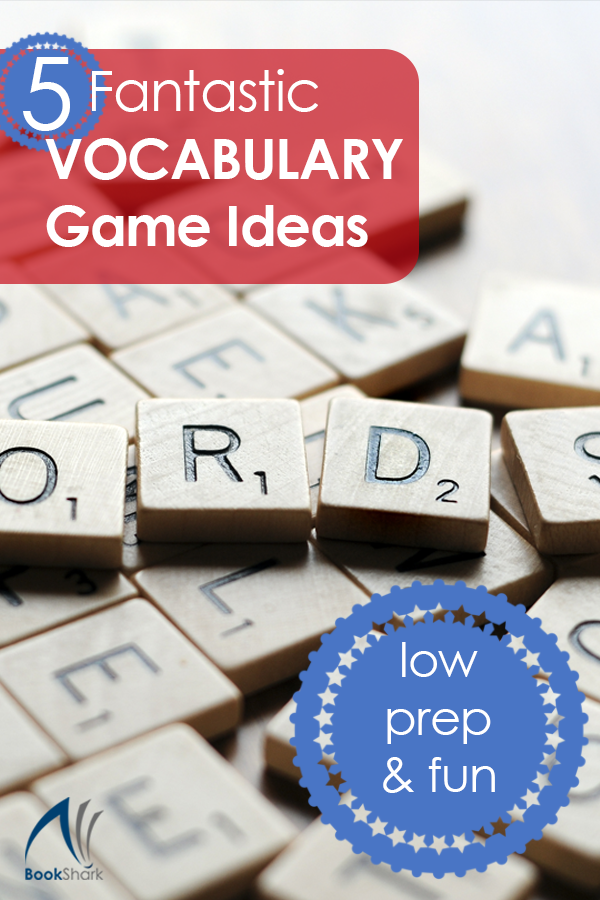




5 Fantastic Vocabulary Game Ideas

In our homeschool, my children constantly encounter new vocabulary words during their individual reading time or during BookShark lessons. My naturally curious kids are great about asking, “What does this word mean, Mom?” Typically I ask them to look it up using an online dictionary. But sometimes we use them our new words in one of these five fantastic vocabulary games.
1. Vocabulary Cube
This game requires a small bit of prep work. Make a large cube out of cardstock, the bottom of a milk carton, or the side of a cereal box.
When it’s time to play a vocabulary game for the week, write six new words the sides of the cube. If you apply clear contact paper to your cube, you can use a dry erase marker to write the words and then easily erase them for the next game.
Have your student roll the cube or throw it in the air and catch it. Whichever word he lands on is the word he has to define.
You can jazz up the game a bit by using a timer, having two kids compete to see who can get the most correct after so many tries or any other variables you can think of that would make the game more interesting such as acting out the word or using the word in a sentence.
2. Vocabulary Signs

This is a simple yet effective activity and works especially well for foreign language vocabulary.
Take a few index cards and write your vocabulary words on them. Then affix the cards in places where the words are within context. For example, if you are introducing the Spanish word for chair, you can write silla on the index card and tape it to a chair in the room. If the word is a verb, hang the card in an area where you would normally perform that action.
This activity is also great for early learning and lower grades, as they are increasing their word recognition skills. You could take this game up a notch by adding a spelling component to the activity. Have your child say the word, touch the object, then spell the word without looking at it.
3. Vocabulary Bingo
Vocabulary lends itself easily to this classic, low-prep game. All you need are bingo cards and chips. You can make cards yourself by drawing a grid with 25 squares. Leave the center square as a free space, and write vocabulary words in each of the remaining 24 spaces.
Give your child a set of chips (use beans, paper clips, or any small objects). Call out the definitions and have the child cover the words that match. When a player reaches five in a row (horizontally or vertically), they yell BINGO! To make it even more challenging, have the winner spell the vocabulary words in the winning row or use them in sentences.
4. Pictionary
This game works well with three or more players and a large collection of vocabulary words. First write your vocabulary words onto cards and give a stack of cards to each child. On each person’s turn, he selects a card from his deck and attempts to get the other players to guess his word based on what he draws on a marker board or chalk board. Using symbols, letters, or numbers is not permitted.
The first child to guess the word correctly scores a point. The child with the most points at the end of the round wins the game.
5. Charades
Similar to Pictionary, you need two teams for this game, and four or more kids is optimal. Split the kids into two teams; then have a representative from each team act out the same word. Whichever team guesses the word first scores the point. Whoever has the most points wins the round.
For all of these games, don’t stress about the actual rules or how to play. The main goal is to create memorable learning experiences that will motivate your children and teach them new vocabulary words.